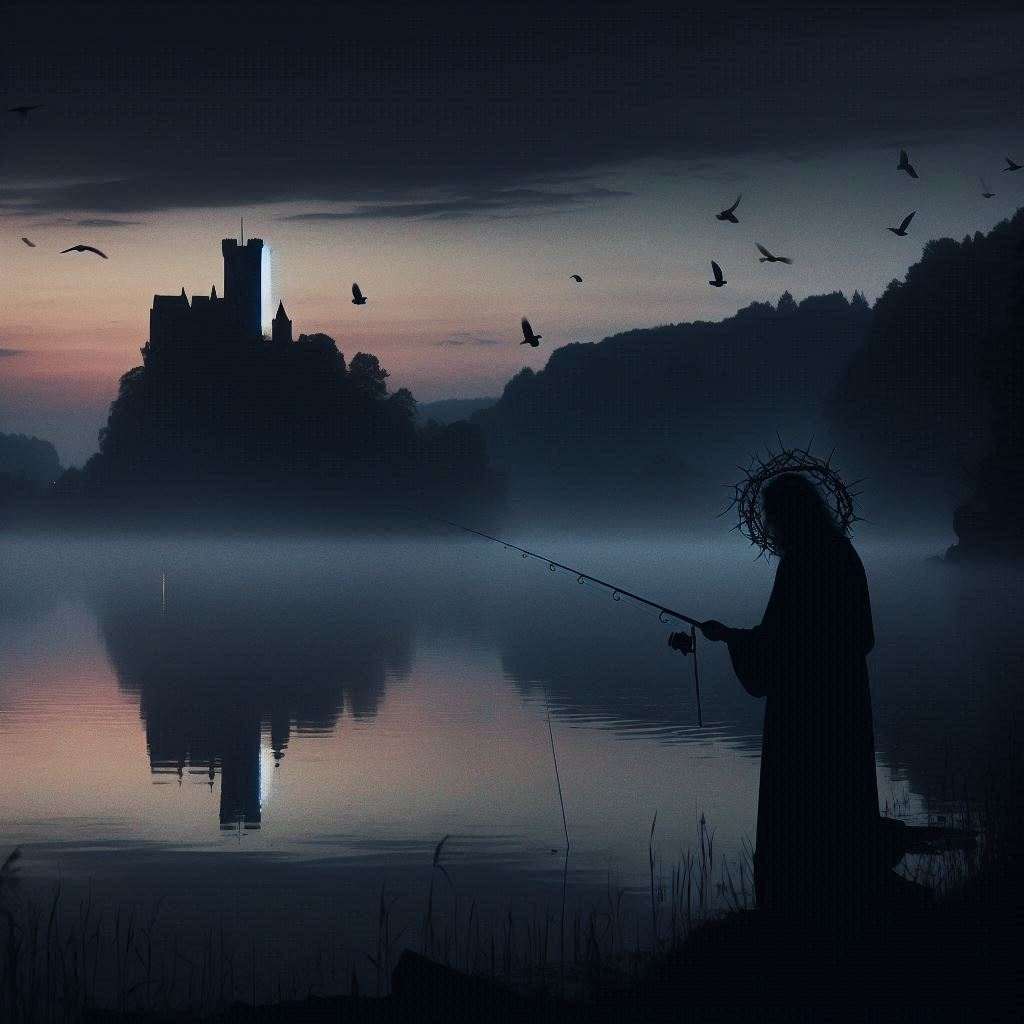The Fisher King of Dinas Bran
Richard

On a hilltop crowned with crows, Dinas Bran, a castle old,
Whispers echo, legends grow, of a king with a heart of gold.
Bran the Blessed, they once did call, a ruler wise and strong,
But a wound unseen did bring him fall, and a kingdom filled with wrong.
The Fisher King, by the misty lake, a crown of thorns upon his brow,
Casts his line for a fish to take, a cure for the land, somehow.
The land grows barren, the people grieve, a sickness hangs in the air,
Only the Grail, some believe, can lift the curse and end despair.
From Celtic myths, his story weaves, a king of summer's light,
Guiding souls to the Otherworld, beneath the moonlit night.
But darkness crept, a twisted spear, pierced him through with unseen blight,
His touch now withers, year by year, the land withers in his sight.
Is Dinas Bran his castle keep? A fortress shrouded in mist?
Do whispers on the Welsh wind creep, of the Fisher King unkissed?
Or is it just a tale they tell, to fill the hearts of men with fright?
A legend's echo, a haunting spell, beneath the cold and starry night.
Then came a knight, with heart so pure, on a quest for the sacred cup,
The Grail, a vision, ever sure, to lift the curse and fill it up.
He faced trials, both fierce and grand, through forests deep and mountains high,
Until he reached the Fisher's land, beneath the weeping, mournful sky.
The Fisher King, with eyes downcast, beheld the knight, a hopeful spark,
"Ask your question, the die is cast," he rasped, a voice worn thin and dark.
The knight, with courage, pure and bright, spoke the words to break the spell,
And as he spoke, a radiant light, bathed the land, a wondrous well.
But legends weave a double thread, a truth to cause both fear and awe,
Bran's head, they say, when life had fled, lies buried deep beneath the law.
In London's heart, the ravens call, where once the Tower did rise,
And Britain's fate may stand or fall, on those black wings that paint the skies.
The Fisher King, with newfound strength, rose from his throne of pain and woe,
The Grail, a symbol at last length, had brought new life, a fertile flow.
The land rejoiced, the crows took flight, on Dinas Bran, the castle strong,
For in the depths where shadows lie, the Fisher King's hope lived on in song.
But heed the whispers on the breeze, the ravens' watchful, dark display,
For Bran still guards, beyond the seas, and Britain's fate may turn to grey.
Richard's The Fisher King of Dinas Bran
The Fisher King of Dinas Bran weaves a tapestry of myth, legend, and symbolism, drawing upon Celtic lore and Arthurian tradition to create a haunting narrative of suffering, redemption, and the cyclical nature of power. At its core, the song explores the profound connection between a ruler and their land, a theme deeply rooted in ancient beliefs and modern environmental concerns alike.
The Fisher King, traditionally associated with the Grail legend, is reimagined here as Bran the Blessed, a figure from Welsh mythology. This blending of traditions creates a rich, multilayered story that speaks to the universality of human struggle and hope. The king's wound, described as "unseen" and inflicted by a "twisted spear," becomes a powerful metaphor for the hidden burdens of leadership and the insidious nature of corruption.
As the king suffers, so does his kingdom. The land "grows barren," and "a sickness hangs in the air," vividly illustrating the concept that a leader's well-being is intrinsically tied to the health of their realm. This can be interpreted both literally, as in ancient beliefs about divine kingship, and metaphorically, reflecting how a nation's spirit and prosperity can wither under poor or afflicted leadership.
The recurring image of the Fisher King by the "misty lake" with his "crown of thorns" evokes a sense of isolation and penance. The act of fishing becomes a ritual of hope, a desperate search for healing and renewal. The mention of the Grail introduces an element of divine intervention, suggesting that some wounds can only be healed through a higher power or a fundamental shift in understanding.
Dinas Bran, the Welsh castle, serves as a focal point for the legend, grounding the mythical tale in a real location. The question of whether it truly houses the Fisher King adds an air of mystery and invites the listener to ponder the thin line between history and myth. The "whispers on the Welsh wind" and the "haunting spell" underscore the enduring power of stories to shape our perception of place and time.
The arrival of the pure-hearted knight introduces a classic quest narrative, symbolizing the potential for change and renewal. The knight's journey through "forests deep and mountains high" mirrors the internal struggles one must overcome to bring about meaningful transformation. The climactic moment when the knight asks the right question highlights the importance of empathy and understanding in healing both personal and societal wounds.
Intriguingly, the song doesn't end with a simple happily-ever-after. The mention of Bran's buried head and the ravens at the Tower of London introduces a note of ongoing vigilance. It suggests that while healing is possible, the potential for darkness and fall is ever-present. The image of ravens, traditionally associated with prophecy and protection, adds a layer of ambiguity to the tale's resolution.
In its entirety, "The Fisher King of Dinas Bran" is a meditation on the nature of leadership, the cyclical patterns of history, and the enduring power of hope in the face of seemingly insurmountable odds. It challenges listeners to consider their own roles in the health of their communities and the importance of seeking understanding and healing, both for oneself and for the wider world.
This text was generated by AI and is for reference only. Learn more
Want to join the discussion? Reopen or create a unique username to comment. No personal details required!



Comments
No comments yet. Be the first to comment!